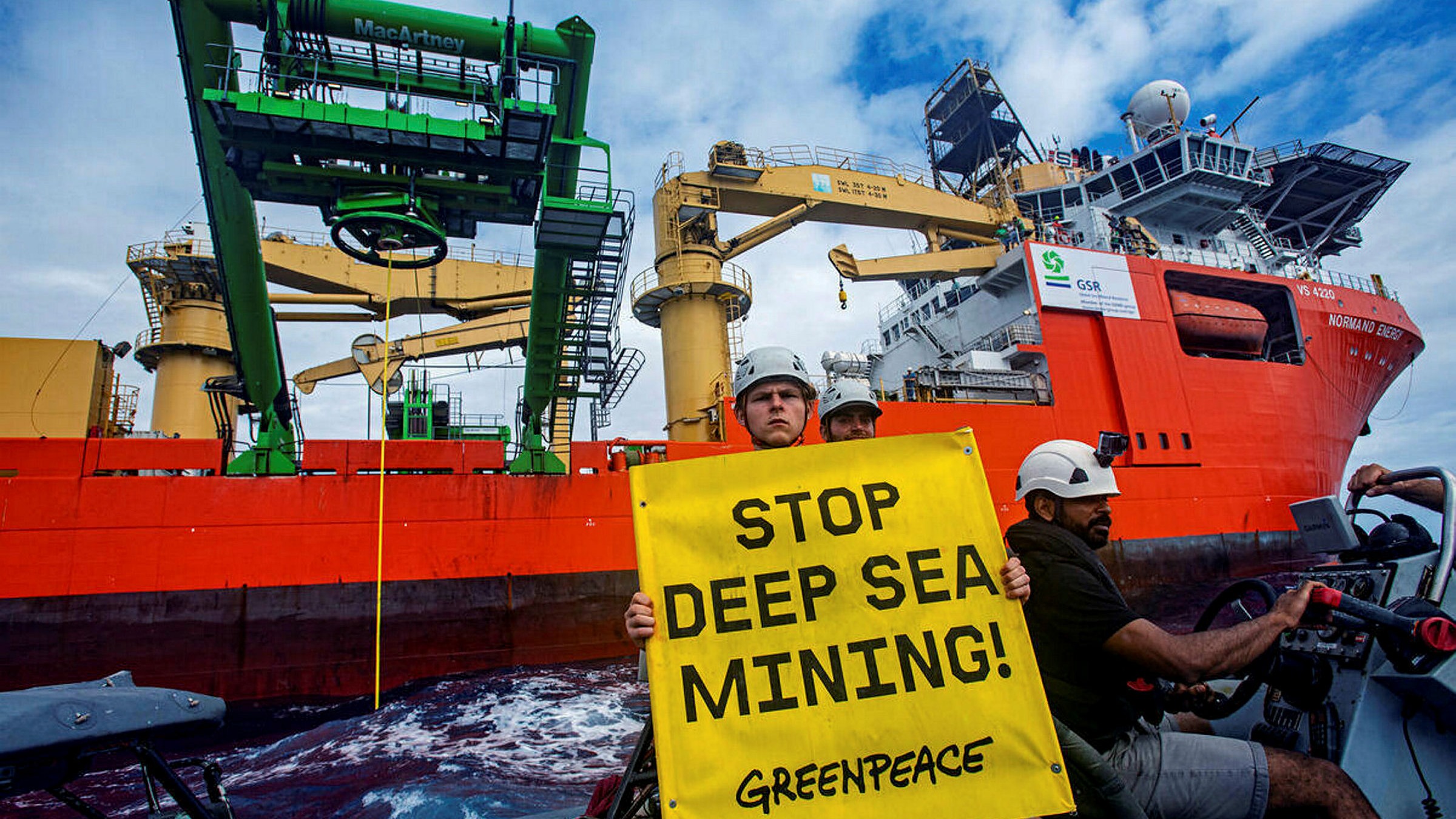Saturday 28 October 2023 | Written by Te Ipukarea Society | Published in Environment, National

Greenpeace activists protest against deep-sea mining in the Pacific. DeepGreen says the deep sea has enough metal to electrify the entire global fleet of vehicles. Picture: Marten van Dijl/Greenpeace/22112550
However, this transition has raised concerns about the environmental impact of mining for minerals like copper, manganese, cobalt, and nickel, which are commonly used for battery production. The Cook Islands is positioning itself as a future supplier of these metals by mining the deep seabed of our Marae Moana. This will cause significant environmental damage.
With the 28th session of the International Seabed Authority (ISA) Council Meeting happening in Jamaica this coming week, lets take a look at some more reasons why deep seabed mining does not need to happen. This article dives into the alternatives that can ensure a green and just transition while preserving our fragile deep-sea ecosystems.
While deep-sea mining has been advocated as necessary for the green transition, experts and industry leaders are increasingly arguing against the need for minerals from the deep sea. The European Academies Science Advisory Council (EASAC) has emphasised that the push for deep-sea mining is primarily driven by industry and economic interests rather than genuine green technology needs. It is crucial to assess alternatives that can help us transition to a sustainable future without jeopardising our oceans.
One of the primary drivers of critical mineral demand is the exponential growth in electric vehicle (EV) production. However, battery technology is evolving rapidly, and new innovations are opening up possibilities for greener and more sustainable alternatives. Significant investments in innovation have paved the way for the next generation of longer-lived batteries that do not need deep-sea minerals.
Alternatives include cobalt-free lithium iron phosphate (LFP) batteries, lithium-free sodium-ion batteries, and solid-state batteries. LFP batteries have already seen significant adoption, with companies like Tesla, Ford, and Volkswagen planning to utilise this technology. Moreover, sodium-ion batteries are on the horizon, with carmakers like BYD and Catl announcing their development. Solid-state batteries, considered the ‘holy grail’ of battery technology, offer a promising alternative by being lightweight, having faster charging times, and not relying on critical deep-sea minerals.
The transition to a circular economy is another obvious way to reduce the demand for virgin-mined materials. Research indicates that recycling can significantly reduce the need for new mining. It is technically feasible to recover and recycle upwards of 95% of lithium, nickel, cobalt, and copper in batteries. Additionally, before recycling, batteries can also be reused, refurbished, or repurposed, extending their lifecycle. This approach can reduce a battery’s carbon footprint and minimise the need for new mining.
Governments and organisations worldwide are taking steps to reduce mineral demand through policy and regulations. For example, the European Union has established recycling targets for raw materials, such as cobalt and nickel, which will significantly reduce demand for these minerals. Similarly, the U.S. is investing in research and measures to promote end-of-life reuse and recycling of critical materials. Major private companies, including Apple, are committing to using recycled materials in their products.
Reducing global demand for minerals and metals is crucial for sustainability. The disproportionate consumption patterns of the richest and poorest populations must be addressed. Natural resource extraction contributes to biodiversity loss, water stress, and greenhouse gas emissions. A circular, holistic approach to the supply chain of low-carbon technologies is vital. Reducing societal demand for energy through sustainable transport and infrastructure systems can further alleviate mineral demand.
The transition to a green and just future does not necessitate the destruction of deep-sea ecosystems through mining. With innovations in battery technology, circular economy strategies, and a focus on reducing global demand for minerals, it is possible to meet the critical mineral requirements for a sustainable future without compromising the integrity of our oceans. By embracing these alternatives and supporting a circular, eco-friendly approach, we can leave a better world for future generations.